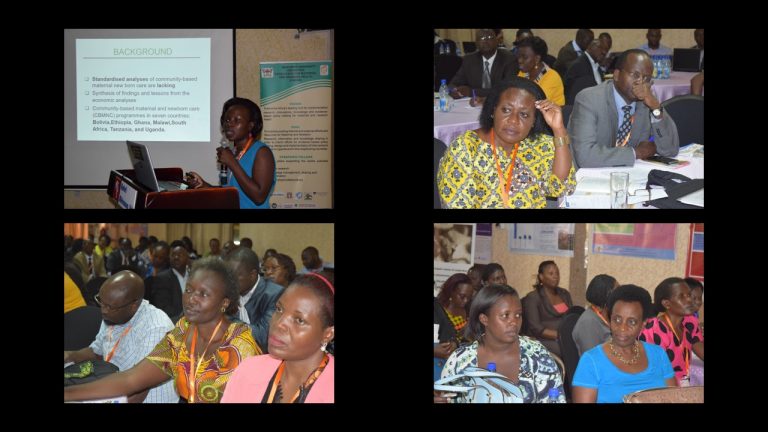Originally posted on CMNHR. Blog written by Prof. Peter Waiswa (CMNHR Team Leader) and Dr Monica Okuga (CMNHR Coordinator).
The 2016 Uganda Maternal and Newborn symposium held October 19 in Kampala came at a strategic time of one year after the end of the Millennium Development Goals and one year into the Sustainable Development Goals era.The SDGs have more ambitious health goals and targets as packaged under SDG Three (3) than what the Millennium Development Goals had. Specifically for mothers and children, the global agenda calls for reducing maternal mortality to a global average of under 70/10000 live births and ending all preventable deaths for newborns and children. The symposium whose theme was ‘Maternal and newborn care in Uganda: High impact innovations for scale up” focused on sharing experiences in implementing high impact interventions at scale for maternal and newborn health in Uganda.Scalable Innovations will be critical as we embark on the post MDG era if we are to do things differently.
The symposium addressed local issues which most global conferences do not. The rich insightful discussions that emerged are very important in steering the process of learning from implementation, adapting, planning and decision making for better MNCH outcomes. Notwithstanding, such discussions also complement the global agenda which is already well known.
Unique to this year’s conference was the presence of distinguished scholars with vast expertise in the largely successful HIV response. Professors Fred Wabwire-Mangen and David Serwadda’s keynote addresses were invaluable to the Maternal and Newborn fraternity as they came with many lessons from three decades of successfully mitigating the HIV/AIDS pandemic. One of the key messages from the HIV/AIDs gurus was “We are not going to get more money necessarily focusing on newborn; it is a question of how we are going to package, develop the advocacy, create this an emergency and human rights issue, to be able to tap into the resources that are already available……. Make the case that this is not a situation that can be ignored. Embarrass everybody for not doing anything.”
HIV/AIDS, malaria and TB has built capacity, yet HIV/AIDS deaths (42,000) are just less than half of maternal, newborn and still birth deaths (85,000) in Uganda. Participants called on government and donors to embrace local capacity building especially by embedding into national programs and projects implementation research by academia to ensure learning and adaptation for scale up of high impact interventions.
Also hot on the discussion floor was the issue of the new Community Health Extension Workers (CHEWs) policy and strategy in Uganda. This controversial subject elicited lots of feelings, emotions and valuable discussion. Overall, it was agreed that this was an opportunity for Uganda but with lots of challenges and requires careful consideration in terms coverage, cost and sustainability.
The need for strong leadership, champions, advocates and partnerships if we are to make progress in saving every mother, every baby and very child was reiterated. Politicians are also very critical for this to happen and the role of the private sector here cannot be under estimated.
Quality of care is still key and requires investment especially for effective care at and around the time of birth. We need to invest in our health care system in terms of skilled health workers, medical supplies, equipment etc. Also improved access and equity will give us leverage in some of our MNH indicators.
Despite the many feasible, affordable innovations that have been tested countrywide, only few have been scaled up. Participants decried the syndrome of piloting and never scaling up any of these interventions. We need to learn how to scale up interventions that have impact and not only stop at pilot testing them.
In summary, the key messages that emerged from the robust conference discussions were:
- Strong leadership and governance is required for success.
- Advocacy for more investment in maternal and newborn health needs to be strengthened.
- Partnerships and collaborations are critical; not forgetting the private sector
- We need to harness the power of voices (families, communities, and media) to cause change.
- Bridging the gap between service delivery and the community through the CHEWS/CHWs is essential
- Integration of Maternal and Newborn Care into HIV/AIDS
- Scale up of feasible, affordable interventions
